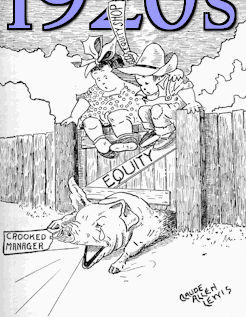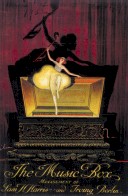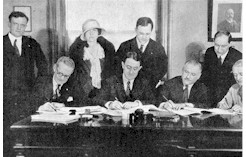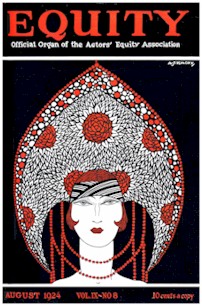 |
|
 |
Intro | First Years | 1919 | 1920's | 1930's | 1940's | 1950's | 1960's | 1970's | 1980's | 1990's 2000-2003 | 2004 | 2005 | 2006 | 2007 | 2008 | 2009 | 2010 | 2011 | 2012 | 2013 |
 |
"We have shed our baby teeth" |
 Will the 1920's bring Equity Shop? 1920
January 14
Frank Gillmore travels to Los Angeles to investigate working conditions for movie actors. February
Vanity Fair writes, "At Last An American Tragedy": Eugene O'Neill opens his first full-length play, Beyond the Horizon, at the Morosco. Later this year, the play will win the Pulitzer Prize. March 23
The AF of L declares that Equity has jurisdiction over principal actors in motion pictures. November 1
Eugene O'Neill opens The Emperor Jones at the Neighborhood Playhouse to rave reviews. The play features Charles Gilpin in the lead. The play will later move to Broadway. Chorus Equity votes in a practical amalgamation between Chorus and Actors Equity: the two groups stay independent, but share a common council. The Nineteenth Amendment is ratified: America's women have the vote. Warren G. Harding is elected the 29th President of the United States. 1921
"Two years ago we went over the top. Today we are digging in." With the strike over, the call for an Equity Shop continues. In March, membership votes in favor of the principle 3,398 to 115. February
The State and Ohio Theaters open, the first theatres in Cleveland's Playhouse Square district. May 23
Shuffle Along by Noble Sissel and Eubie Blake, the first musical revue written and performed by African-Americans (cast members include Josephine Baker and Florence Mills), opens at the Sixty-Third Street Theatre. September 22
Irving Berlin opens his Music Box Theatre on Broadway.  (Image Credit: Shubert Archive)
November 2
O'Neill opens Anna Christie, his second Pulitzer Prize winner, at the Vanderbilt. 1922
January
O'Neill's The Emperor Jones opens in Norfolk, VA, the first production to play Southern states to have an African-American in the lead. Equity resists the push for a seven day work week for actors. In a plea to audiences, an Equity editorial reads, "Do you remember how you felt after playing the 'Spirit of Charity' in the church festival for nine consecutive minutes? How would you like to do something like that for thirty or ninety minutes each night?" May 23
October 2
The Equity Players, a theatre company run by AEA, premieres at the Forty-Eighth Street Theatre with Malvaloca, a Spanish classic. 1923
January
Equity Council appoints a committee to draft a standard minimum contract for motion picture actors. March
In a general meeting, Equity reaffirms its disdain for Sunday performances, despite a bill pending in Albany to legalize them. The bill is defeated later in the year. |
June
Frank Gillmore, Executive Secretary and Treasurer, announces that Equity has $110,923 in assets - a good war-chest if a strike comes next year. Calvin Coolidge becomes the 30th President when Harding dies suddenly. 1924
"The mind of Actors' Equity is made up" says Equity Magazine. There will be no bending this year on Equity Shop. May 15
O'Neill's play All God's Chillun Got Wings opens at the Provincetown Playhouse starring Paul Robeson. The story of a love between a black man and a white woman garners controversy and great reviews. May 31
With no signed agreement between Equity and the PMA, the theatres of those producers who have not agreed to Equity Shop, seven all together, are shut down. An agreement is reached: 80% of cast members in legitimate houses must be Equity - the rest must still pay dues. Bonding provisions are achieved, holding in escrow a two-week salary guarantee to cover every Equity member in a company. August
"My candidacy represents nothing more than the effort of the plain people - of which I am one, very plain, that's why I'm in the 'Follies' - to remedy this disastrous condition of affairs." Will Rogers becomes the first actor to have been placed in nomination for President of the United States George Gershwin writes "Rhapsody in Blue." Calvin Coolidge is elected President. J. Edgar Hoover becomes director of what will become the FBI. 1925
February 24
Equity moves into its new home at 45 West 47th Street. April
100 Equity members in Hollywood sign pledges asking the Association of Motion Picture Producers to recognize Equity as the bargaining agent for movie actors. In July, movie executives Will Hays and Joseph Schenck reject Equity's Shop proposal. Broadway's Rivoli and Rialto are the world's first air-conditioned theatres. 1926
"So now we are in our teens. We have been through the measles, whooping cough, and other ailments to which youngsters are susceptible. We have shed our baby teeth and have now a good set of permanent ones." June 14
Paul Green wins the Pulitzer Prize for his play In Abraham's Bosom. November 8
Oh, Kay! by the Gershwins opens at the Imperial, including the song "Someone To Watch Over Me." 1927
February 9
Police raid three plays, The Virgin Man, The Captive, and Mae West's Sex. Equity protests the arrests of the actors, stating, "The actor is not responsible for the content of the play..." Later in the year, Governor Al Smith signs the Wales Theatrical Padlock Bill, giving local authorities the power to close shows they deem obscene. In May, the Academy of Motion Picture Arts and Sciences is formed. On June 23, movie producers announce their intention to slash the salaries of all non-contract players. Contract players will be "asked" to take a reduction in pay. In July, Equity Magazine urges film actors to organize under the Union: "The film actors and actresses know they need Equity now."  1924: Officers of Equity, Chorus Equity, and the Managers' Protective Association
putting their signatures on the contracts that mean peace in the theatre for the
next ten years, witnessed by their attorneys.
1924: Officers of Equity, Chorus Equity, and the Managers' Protective Association
putting their signatures on the contracts that mean peace in the theatre for the
next ten years, witnessed by their attorneys.
July 6
800 actors and actresses meet at the Screenwriters' Club in Los Angeles; it is unanimously voted that Equity Shop should be the policy of the Los Angeles branch. However, on the 13th, the Academy of Motion Picture Arts and Sciences decides it will not cooperate with Equity. A standard contract is promised by the Academy and the call for salary cuts is rescinded. With this in mind, the members vote against Equity Shop for now. In December, Variety reports on the first contract issued by the Academy of Motion Picture Arts and Sciences: a freelance agreement between motion picture actors and producers. The contract does not include compulsory arbitration or guarantees of continuous performance. Equity writes, "Equity feels that the majority of the better paid among the motion picture actors failed in their duty to themselves and to their less fortunate associates. They insist on living only in the present and declined to see into the future." The 1927/1928 Broadway season remains the most popular on record, with 264 productions on Broadway. Burns Mantle of The Daily News said, "It was nothing to brag of, as seasons go, nor one of which we are exactly ashamed..." |
 Equity Magazine 1924
December 27
Jerome Kern and Oscar Hammerstein II open Show Boat at the Ziegfeld Theatre. Chartered this year as a not-for-profit theatre, the Studio Theatre School in Buffalo, New York will become the Studio Arena in 1965. The Jazz Singer, the first feature film with some talking, opens, starring Al Jolson. 1928
January
To protest his snide reviews, the Shuberts ban Walter Winchell from their theatres. He says, "If I can't go to their openings, I'll wait three days and go to their closings." February 12
After American actress Alden Gay is barred from a British production, Equity places limitations upon the membership of foreign actors. In May, Alexander Woollcott writes, "...the English actors now in this country are wearing a hunted look..." February
Because of the high occurrence of actors being asked to direct, Equity extends a measure of protection to directors, although it does not plan on creating a directors union or a closed shop. March 3
Equity headline: "The Padlock's Shadow Falls Across Broadway." Maya, a play about a prostitute, is shut down. July 18
The movies become more and more of a problem, not only in their popularity and cheap prices, but their talent drain. Variety headline: "Talkers Hot After Legit Talent." August 14
The Front Page by Ben Hecht and Charles MacArthur opens at the Times Square Theatre. September 6
Equity temporarily suspends Paul Robeson, after he reneges on a contract with a New York-bound revue in order to play Joe in the London production of Show Boat. Robeson later settles with the producers and is reinstated. September 7
Machinal by Sophie Treadwell opens at the Plymouth. June
Two organizations are watching Eugene O'Neill's new play, Strange Interlude: the District Attorney's office with an eye to closing it down, and the Pulitzer Prize Committee, considering awarding it this year's prize. The play wins the Pulitzer; it is not shut down. July
Equity begins a campaign against financial abuses by talent agents. In October, Council agrees that all Equity members must work with agents licensed through Equity. Two days later, Personal Representative William Edelstein brings suit against the union. December 20 - Although 25 Broadway houses are dark and unemployment among actors is high, Ethel Barrymore opens the theatre named after her in The Kingdom of God. Later, the Ethel Barrymore theatre will later be called only The Barrymore after a dispute between Ms. Barrymore and the Shuberts. Despite continued pressure from Equity and the managers, and the fact that peace is now a decade old, the 10% war tax on theatre tickets is still firmly in place. "The First Crop of Actors' Fund Benefits" reads the headline in Equity Magazine. It is quite a harvest as the first year of special matinees for the Actors' Fund begins. British Equity, patterned after AEA, has its first meeting. Herbert Hoover is elected President of the United States. 1929
Franchising of talent agents is begun and rules established. In August, the Federal Circuit Court of Appeals upholds Equity's position. June 5
Equity declares that Equity Shop will be extended to cover talking pictures. The next day Cecil B. De Mille announces that producers will continue to use their own contracts. A strike is called, but Equity exempts contract players. The strike ends unsuccessfully on August 17th. Equity Magazine still declares, "Equity is only beginning in Hollywood." June 10
Walter Winchell moves his column to the New York Mirror. October 9
June Moon by George S. Kaufman and Ring Lardner opens at the Broadhurst. October 17
Alfred Harding publishes The Revolt of the Actors, a chronicle of the 1919 strike and Equity history through 1929. October 29
The Stock Market crashes, plunging the nation into a depression. November 27
New York receives anti-Depression therapy in the form of Fifty Million Frenchmen by Cole Porter opening tonight at the Lyric, featuring the song "You Do Something To Me."
December 10: The Pathe Sound Studio at Park Avenue and 134th Street in New York City burns down. The fire is put out in one hour, but ten people are killed, including four members of Chorus Equity.
|
||
| to timeline introduction... | ||||
 Abie's Irish Rose by Anne Nichols opens at the Fulton. Critics hate it, audiences love it. Robert Benchley writes, "People laugh at this every night, which explains why democracy can never be a success." It will run for 2,327 performances.
Abie's Irish Rose by Anne Nichols opens at the Fulton. Critics hate it, audiences love it. Robert Benchley writes, "People laugh at this every night, which explains why democracy can never be a success." It will run for 2,327 performances.